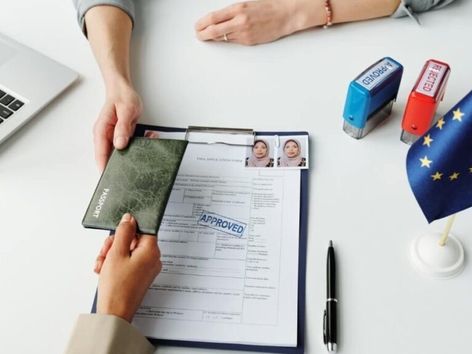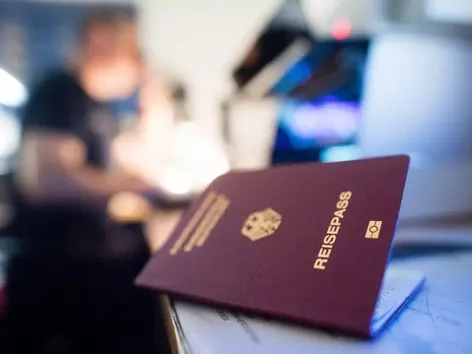Germany reduces visa processing time for workers from India: what is known

The German government has decided to reduce the waiting period for a visa for skilled workers from India from 9 months to 2 weeks. Find out more about the details of the initiative, available vacancies and required documents for applying for a German work visa
The German government has significantly reduced the time for issuing visas for skilled workers from India. Now, instead of waiting 9 months for a long-term visa, the process takes only 2 weeks.
This important news was confirmed by the German Foreign Minister, emphasizing the government's commitment to reducing waiting times for the 400,000 people who face difficulties in applying for national visas.
The German Foreign Office has already become the largest visa office in the world in terms of the number of national visas issued. The situation in India is particularly illustrative: Delhi has managed to reduce the waiting time for national visas to two weeks, which previously took nine months. This step is aimed at attracting the necessary skilled workers who will contribute to the country's economic development.
According to statistics, the largest number of labor migrants arrive in Germany from Poland, India, Turkey and Romania.
You can learn more about the peculiarities and conditions for obtaining a Chancenkarte visa in Germany here.
How does the duration of work visas affect the German economy?
German companies have high hopes for accelerated visa processing, which will help fill the labor shortage, especially in such important areas as education and medicine. Indian investors who are actively developing business in Germany also expect fast visa processing for their specialists, which will allow them to quickly send them to work in the EU.
Germany's hospitality, which ranges from embassies to kindergartens, emphasizes the importance of attracting new employees. According to the German Institute for Economics (IW), 570,000 jobs remained unfilled in the country in 2023, which negatively affects the economy. Germany could achieve better results if it had a sufficient number of workers.
Fast visa processing would allow foreign professionals to come to Germany and help revive the country's economy, which is currently experiencing a significant decline. IW estimates that Germany's lost production potential could amount to 74 billion euros by 2027 if the labor shortage is not addressed.
How many work visas did Germany issue in 2024?
According to the Federal Foreign Office of Germany, the country issued 80,000 work visas in the first half of 2024. Skilled workers were the main recipients of these national visas, receiving 40,000 documents. This is 3,000 more than in the same period in 2023.
This step is part of the “Action Plan to speed up the issuance of visas”, which was launched last year by the German Foreign Office. However, despite the positive dynamics, the German Economic Institute (IW) warns that there is a risk of economic losses that could reach 49 billion euros if this plan is not implemented properly.
What jobs in Germany are available for migrants from India in 2024?
Germany is one of the most attractive countries for migrants, particularly from India, due to its developed economy, high living standards and stable labor market. Migrants from India who are planning to move to Germany can find a wide range of job opportunities in various fields where their skills and knowledge will be highly valued:
1. Information technology (IT) and programming. The IT sector remains one of the most popular in Germany. Many companies, from start-ups to large corporations, are constantly looking for qualified programmers, software developers, cybersecurity specialists, and data analysts. Indian IT professionals, known for their high technical knowledge, have a great chance of finding a job in this field. Proficiency in programming languages such as Java, Python, C++, and experience with cloud technologies and big data significantly increase employment chances;
2. Engineering. Germany is famous for its engineering culture, and the demand for engineers is constantly high. Specialists in mechanical engineering, electrical engineering, automotive engineering, and civil engineering are especially in demand. Indian engineers with the right education and experience can find numerous opportunities in manufacturing companies, automotive companies, and construction firms in Germany;
3. Medicine and healthcare. Healthcare professionals, in particular nurses and nursing specialists, are in high demand in Germany. Due to an aging population, the country needs more healthcare professionals. Indian doctors with the appropriate qualifications can get a job in hospitals, clinics or private practice. To do so, they need to pass a qualification confirmation procedure and obtain a work permit;
4. Research and teaching. Germany is actively investing in research, so vacancies in scientific institutions and universities are always relevant. Professionals from India with a degree or experience in research can find jobs in the fields of biotechnology, physics, chemistry and other sciences. In addition, vacancies at universities as teachers or researchers are also available for qualified candidates;
5. Finance and banking. The German financial sector is in constant need of qualified personnel. Professionals from India with experience in financial analysis, accounting, risk management or banking have a good chance of finding a job. Knowledge of international financial standards and experience with global clients will be an added advantage;
6. Hospitality and tourism. Germany also offers opportunities for migrants in the field of hospitality and tourism. Vacancies in the hotel business, restaurants, travel agencies and airports may be interesting for those with experience in this field.
How to get a work visa to Germany?
The new law on labor migration in Germany is aimed at attracting workers not only with higher but also with secondary vocational education, making it easier for them to access the German labor market. An important change is the abolition of the rule of preliminary checking for competition with local unemployed, which previously applied to all professions. Now, it will be enough to prove that the education is recognized in Germany and that the applicant has a work contract corresponding to the specialty.
Employees with a recognized secondary education diploma will be able to obtain a six-month visa to look for work. Previously, this was only available to migrants with higher education. However, knowledge of the German language will be additionally required.
For the effective implementation of the new rules in the countries of origin of migrants, embassies should provide for an accelerated procedure for issuing work visas. Currently, it takes 13,400 hours per year to process labor migration decisions, which costs the state 3.4 million euros. Although the new rules will help to partially solve the problem of staff shortages, the government plans to conduct an advertising campaign to attract qualified workers.
For safe relocation to any country in the world, obtaining citizenship and employment, take the advice of an international lawyer. We help to solve complex and simple issues for your comfort and safety in any part of the world.
Labor migration to Germany for highly skilled workers
The new law on labor migration in Germany is aimed at attracting workers not only with higher but also with secondary vocational education, making it easier for them to access the German labor market. An important change is the abolition of the rule of preliminary checking for competition with local unemployed, which previously applied to all professions. Now, it will be enough to prove that the education is recognized in Germany and that the applicant has a work contract corresponding to the specialty.
Employees with a recognized secondary education diploma will be able to obtain a six-month visa to look for work. Previously, this was only available to migrants with higher education. However, knowledge of the German language will be additionally required.
For the effective implementation of the new rules in the countries of origin of migrants, embassies should provide for an accelerated procedure for issuing work visas. Currently, it takes 13,400 hours per year to process labor migration decisions, which costs the state 3.4 million euros. Although the new rules will help to partially solve the problem of staff shortages, the government plans to conduct an advertising campaign to attract qualified workers.
German law §18b allows migrants with higher education to obtain the right to reside in the country under the EU Blue Card program. This requires that the foreign worker's diploma is recognized in Germany as equivalent to a local one and that the salary exceeds the established limits. In such cases, the employer is not obliged to check the availability of local candidates for the position. Migrants who have received a German residence permit under the Blue Card program have significant advantages, including simplified family reunification, where spouses do not need to know German. In addition, they can obtain a permanent residence permit after 21 months.
Similar conditions apply to graduates of German universities. After graduation, foreigners have 18 months to find a job in their specialty. To extend their residence permit, they need to find a job that matches their qualifications and salary.
Highly qualified professionals, such as managers, scientists and key specialists, can obtain a residence permit without being checked at the German labor exchange under §18c if their role is critical to the development of the business or organization. The employer must prove that hiring this migrant is necessary.
Law §18d is aimed at attracting scientists and researchers for scientific activities. And §19c allows to grant a work permit in special cases, even if the diploma does not meet the requirements, but the employee has significant experience and is valuable to the German labor market, for example, in the field of IT.
Regular work visa
For those without a university degree, there are now more opportunities for labor migration. However, a prerequisite is the recognition of your qualifications, similar to the procedure for higher education. It is impossible to get a job as a loader or builder in Germany without the appropriate education, and this applies not only to Germany but also to the entire European Union. A potential employee must have a vocational education, as well as a resume that confirms his or her high qualifications and experience. Specialists in the technical and medical fields have the best chance of success.
The process of obtaining a work visa to Germany involves several steps:
1. Search for a vacancy and pass an interview;
2. Receiving a job offer and signing a contract;
3. Applying to the German embassy;
4. Checking the documents for compliance with the requirements for issuing a work permit;
5. If successful, obtaining a visa to enter Germany.
A national visa of type D is issued upon presentation of an employment contract or confirmed guarantees of a job upon arrival. Citizens of EU countries can work in Germany without restrictions, while the visa-free regime for citizens of other countries does not affect the need to obtain a work visa. In fact, there is no such thing as a “work visa” - instead, a long-term or permanent residence permit is issued in Germany, subject to compliance with the migration laws.
What documents are required to apply for a work visa in Germany?
To obtain a work visa to Germany, you need to prepare a number of documents, the requirements for which are published on the embassy's website. The main ones include:
1. A completed application form in two copies;
2. Passport photos;
3. Employment contract with the employer;
4. Job description to be filled by the employer;
5. Diploma with its translation into German and confirmation of its recognition;
6. Health insurance for the period from the first day of stay to the start of work;
7. It is advisable to take out public health insurance in advance, especially if you plan to travel with your family;
8. Resume in tabular format.
The consulate may also require additional documents, such as proof of work experience, qualifications, and language skills. Be sure to read the memo on the embassy's website to prepare all the necessary documents for your type of visa.
Validity of a work visa in Germany
After obtaining a national visa for a period of 3 to 6 months, upon arrival in Germany, you must apply to the Federal Office for Foreigners (Ausländeramt) to exchange this visa for a residence permit (residence permit). The validity period of a residence permit usually corresponds to the duration of the employment contract. If the contract is open-ended, the residence permit is granted for several years and can be renewed every two years until 5 years have passed, after which it is possible to apply for permanent residence.
In the first three years, a work visa holder is not allowed to change employers without the approval of the Ausländeramt. The name of the company is indicated on the residence permit card. If there is a need to change jobs, this also needs to be agreed with the agency, which will check whether the terms of the new contract meet the requirements for maintaining a residence permit.
In the event of a job loss, it is important to notify the Ausländeramt and Arbeitsagentur in advance. If an immigrant has been working for more than a year, he or she is given three months to find a new job, during which time a special visa is issued. Blue Card holders have the opportunity to obtain permanent residence after 21 months, provided they know the language.
We remind you! In early 2024, the German Parliament adopted a new law on citizenship, which greatly simplifies the naturalization procedure in the country. The document has recently entered into force. Read more about how the procedure for obtaining a German passport has changed and who may be denied German citizenship in 2024.
Ihor Usyk - head of Visit World's legal department
To simplify the move to Germany, as well as facilitate the employment procedure, consult a migration specialist. We help to solve complex and simple issues for your comfort and safety in Germany.
Products from Visit World for a comfortable trip:
Checklist for obtaining a visa and necessary documents in Germany;
Legal advice on business issues in Germany;
Travel insurance for foreigners in Germany;
Medical insurance around the world.
Recommended articles
3 min
Expats
Do you want to live in Germany and work for yourself? It's easy! The country offers a German freelancer visa, which is equivalent to a temporary residence permit. Find out more about the benefits and procedure for obtaining a freelance visa in Germany
06 Aug. 2024
More details1 min
Expats
German citizenship can now be obtained faster: a new procedure has already started in Germany
At the beginning of 2024, the German Parliament adopted a new law on citizenship, which greatly simplifies the naturalization procedure in the country. The other day, the document came into force. Find out how the procedure for acquiring a German passport has changed and who may be denied German citizenship in 2024
02 Jul. 2024
More details2 min
Work
Termination of an employment contract in Germany: when and how can an employer fire you?
Germany attracts expats with career growth prospects and a high standard of living. However, when planning employment in another country, it is necessary to study the local legislation in detail. Understanding the procedure for terminating an employment contract is an important stage of work. Find out under what circumstances you can be fired by your German employer and how it happens
24 Jul. 2024
More details3 min
Events
Munich Oktoberfest 2025: history and program of the festival, tents and other important details
Every year, Munich hosts the largest beer festival in the world at the end of September, attracting more than 6 million tourists. Find out more about the schedule, tents, and program of the Oktoberfest 2025
30 Aug. 2025
More detailsAll materials and articles are owned by VisitWorld.Today and are protected by international intellectual property regulations. When using materials, approval from VisitWorld.Today is required.
